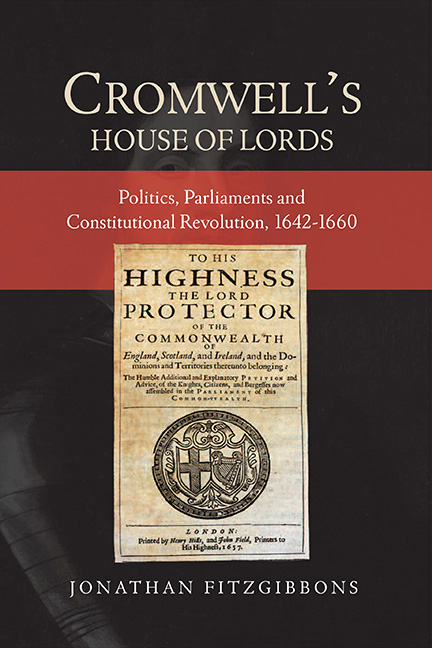Book contents
- Frontmatter
- Contents
- Acknowledgements
- Abbreviations
- Introduction
- 1 Parliamentarian Thought and the Abolition of the House of Lords, 1642–49
- 2 Oliver Cromwell, the Other House and the Humble Petition and Advice
- 3 The Membership of the Other House
- 4 The Other House and the Second Session of the Second Protectorate Parliament
- 5 Richard Cromwell, the Third Protectorate Parliament and the Other House Debates
- 6 The Other House, the Army and the Search for a Settlement
- Conclusion
- Appendix: The Membership of the Other House
- Bibliography
- Index
- Studies in Early Modern Cultural, Political and Social History
5 - Richard Cromwell, the Third Protectorate Parliament and the Other House Debates
Published online by Cambridge University Press: 05 May 2018
- Frontmatter
- Contents
- Acknowledgements
- Abbreviations
- Introduction
- 1 Parliamentarian Thought and the Abolition of the House of Lords, 1642–49
- 2 Oliver Cromwell, the Other House and the Humble Petition and Advice
- 3 The Membership of the Other House
- 4 The Other House and the Second Session of the Second Protectorate Parliament
- 5 Richard Cromwell, the Third Protectorate Parliament and the Other House Debates
- 6 The Other House, the Army and the Search for a Settlement
- Conclusion
- Appendix: The Membership of the Other House
- Bibliography
- Index
- Studies in Early Modern Cultural, Political and Social History
Summary
Despite the stormy dissolution of the second Protectorate Parliament, rumours of a new parliament soon circulated. This was hardly surprising given the regime's financial problems. As Fleetwood complained to Henry Cromwell just days after the dissolution, the problem ‘of money will be most of what we shall finde to obstruct our worke, our treasurey being so low, and occations so great’. Yet, the Council were of two minds about summoning a new parliament so soon after the failure of the previous one. Their indecision is encapsulated in Fleetwood's letter to Henry Cromwell on 2 March in which he claimed ‘we shall suddenly have a parliament’, only to backtrack in a postscript later that day by lamenting that ‘the way seemes more uncerteine and doubtfull’.
Contributing to the Council's delays were renewed disagreements over the future of the settlement. During the 1658 parliamentary session the civilian and military Cromwellians presented a united front against the regime's critics. After the dissolution, however, the military–civilian split erupted once again. As was the case in late 1656, the unravelling of Royalist conspiracies in the spring of 1658 stimulated divergent strategies for security. For the civilians the answer was parliamentary settlement. Writing in late April to Henry Cromwell, Thurloe thought it ‘very unreasonable, that wee should be alarmed once every year with invasions and insurrections’ and believed that ‘security … must be had in parliament’. The military Cromwellians had different ideas. According to Thurloe, they proposed a ‘tax’ upon Royalist ‘estates, or the like’, albeit ‘the major part’ of the Council were ‘wholly averse to use any illegal course’. Writing to Lord Broghill on 7 April, Henry was delighted to hear that his father ‘enclines to a parliament’ and that Desborough's ‘illegal proposalls … for raising money without a parliament, are discouraged’.
Throughout the summer of 1658 the decision to summon parliament continued to be deferred. Although the military Cromwellians apparently came to accept the necessity of a parliament, they disagreed with the civilians over how it should be handled. According to Thurloe, by late June a junto of nine – containing both military and civilian Cromwellians – met ‘dayly to consider ‘what is fitt to be done in the next parliament’.
- Type
- Chapter
- Information
- Cromwell's House of LordsPolitics, Parliaments and Constitutional Revolution, 1642–1660, pp. 155 - 194Publisher: Boydell & BrewerPrint publication year: 2018



